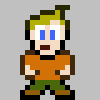Quote:Original post by OmniBrain
Glad you see it the same way like me. Personally I HATE NPCs doing their scripted business and never care about changed environment.
Agreed. I mean, if your shop is on fire, you don't just keep on trying to sell your wares.
Quote:
And as a plus I like to play my own game and being surprised about the action of the NPCs. Giving them just a goal and some behavior parameters and finally watch this turn out into actions I didn't think about is almost a game itself to me.
Heh, that's the nice thing about a suitably developed goal oriented AI, it's behavior should change from run to run, but should stay relatively consistant globaly.
Quote:
Probably the control of a single agent is the same like playing a complete army in an RTS.
In a RTS you as the comander have global GOALS (usually survive and destroy the enemy). You pick some STRATEGIES for your army that are fit to help you getting closer to your GOAL, and on the lower level you have to pick some TACTICS that help you to perform your STRATEGY.
Hrm, about the only RTS, or RTT games that actually allowed for that are the total war games. The rest mostly rely on building up a massive army and then just using overwhelming force (very boring)
Quote:
Now how can this mapped to NPC behavior?
As there are multiple layers of comand in military, there are multiple layers of decision finding with agents:
An agent has GOALS (survive, become rich, kill the murders of his parents).
So, we have agents that represent a general character or set of characters? Now, when i say set of characters, think of a kingdom that is being invaded... Each person in the kingdom will have goals. However the kingdom as a whole has some overwhelming goals.
Quote:
To survive, the STRATEGY is to stay away from danger, and drink/eat regulary.
To drink regulary the agents TACTIC may be to stay close to a river.
The goal of "become rich" will make the agent move to locations with much business, or to areas with resources that can be sold for a good price elsewhere.
hrm...i think we need a better set of terminology than strategy and tactics.
Quote:
(The "kill murder of parents" goal for agents is really a big task and I probably have reached goal "become rich" when I can code this behavior in a few lines of code with taking less than 1% of CPU time. :)
Remember, he did say that he was targetting platforms of the future, so we can imagine that CPU power is not an issue.





